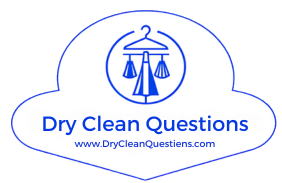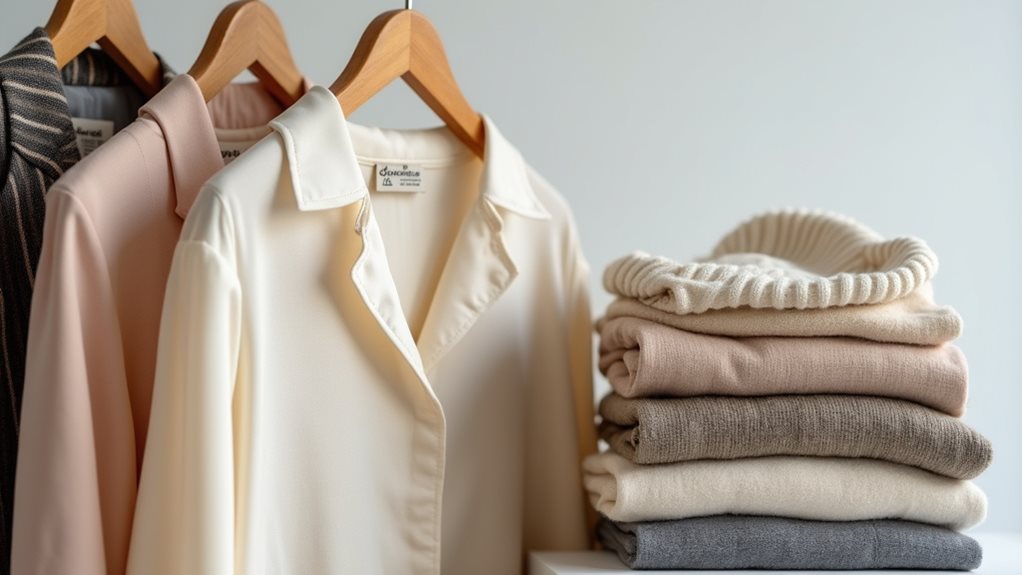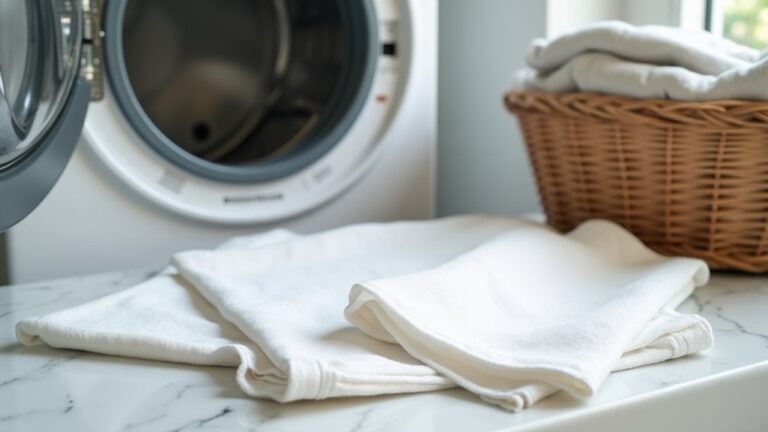You don’t need to dry clean most items labeled “dry clean only” – I’ve saved hundreds by testing garments at home first. Many cotton shirts, polyester blouses, and even some silk scarves can be safely hand-washed or machine-washed on delicate cycles with cold water. The key is doing spot tests on hidden seams to check for color bleeding or fabric damage before committing to a full wash, and you’ll discover which pieces truly require professional care.
Understanding Dry Clean Only Labels and What They Really Mean
How many times have you stood in your closet, staring at that gorgeous silk blouse or custom blazer, wondering if you really need to shell out fifteen dollars for dry cleaning when your washing machine is sitting right there, practically begging for something to do?
That tiny care label isn’t just there to torture your wallet—it’s actually protecting your investment. When manufacturers slap “dry clean only” on delicate fabrics like silk or velvet, they’re genuinely trying to preserve garment integrity and prevent your favorite pieces from turning into expensive rags.
That little care label is your garment’s insurance policy against becoming an expensive mistake.
Sure, some brave souls attempt home washing after doing a spot test, but understanding your fabric type and following washing instructions can seriously extend lifespan.
The dry cleaning process uses chemical solvents instead of water to effectively remove stains and dirt while preventing shrinkage, color bleeding, and fabric damage that traditional washing methods could cause.
Professional dry cleaning exists for good reason!
How to Identify Garments That Truly Require Professional Cleaning
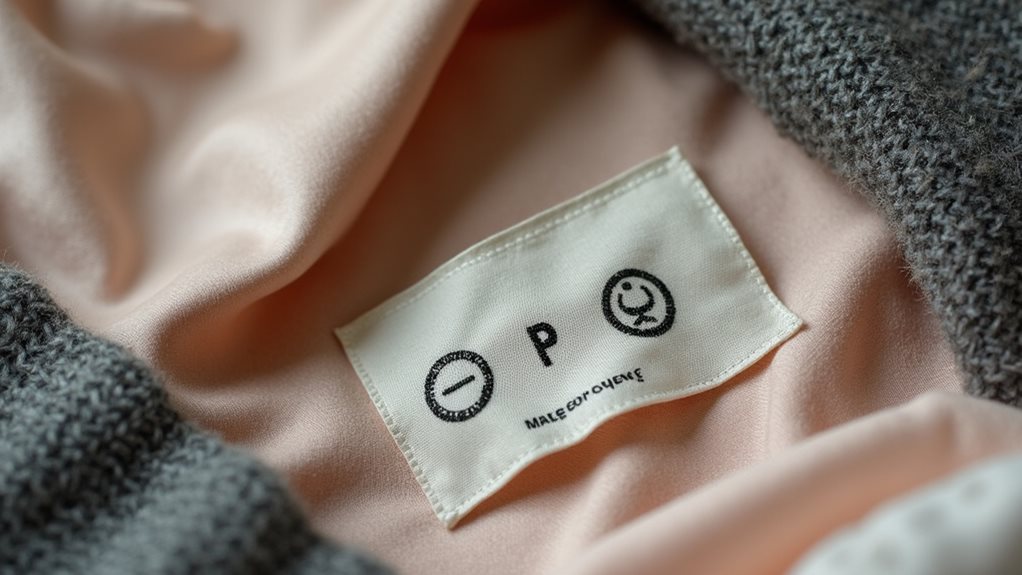
Where exactly do you draw the line between a garment that’s genuinely fragile and one that’s just masquerading as high-maintenance?
Start by checking care instructions – those “dry clean only” labels aren’t just suggestions when it comes to delicate garments like silk blouses or wool coats.
Your fabric type tells the real story: structured customized items and vintage garments with intricate beading genuinely need professional cleaning to maintain integrity.
Here’s my foolproof test: conduct a spot test on hidden seams using a damp cotton swab.
If you see any color bleeding, that’s your colorfastness warning right there! 🚨
Trust me, I’ve learned this lesson the hard way with a favorite vintage dress that turned into an expensive tie-dye experiment.
Dry cleaning uses chemical solvents instead of water to safely remove dirt and stains while preserving the fabric’s structure and preventing the shrinkage that water-based washing can cause.
Safe Methods for Cleaning Delicate Items at Home

Confidence in your own hands becomes your greatest asset when you’ve mastered the gentle art of home cleaning for delicate fabrics.
I’ll admit, my first attempt at hand washing cashmere left me with a sweater that could’ve fit my niece’s teddy bear 😅, but here’s what I’ve learned through trial and plenty of error.
Test first, always – even items marked “dry clean only” might surprise you. Use a hidden seam to check if your mild detergent causes any color bleeding or fabric damage.
That sneaky spot test on a hidden seam can save you from turning your favorite silk blouse into expensive cleaning rags.
When you’re ready for the real deal, cold water becomes your best friend for safe washing.
Place delicate pieces in mesh bags if you’re brave enough to use your machine, then commit to air drying – your care will preserve those precious fabrics beautifully.
For items that need refreshing without full washing, steaming offers an excellent alternative to remove wrinkles and odors from delicate fabrics while being gentler than traditional washing methods.
Factors That Determine Whether Your Clothes Need Dry Cleaning
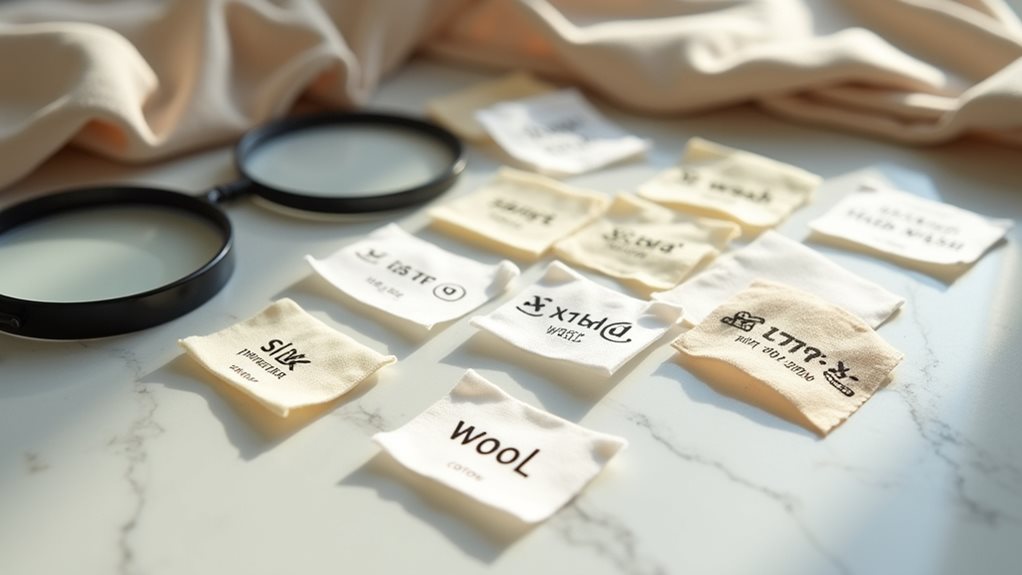
Three key signals will tell you whether that gorgeous blouse or customized jacket truly needs professional care, and honestly, I used to ignore them all until I ruined my favorite silk dress by tossing it in the wash like it was a cotton t-shirt 🤦♀️.
First, always check the care label – when it says “dry clean only,” that’s not a suggestion, it’s a command that’ll save you from fabric damage.
Second, delicate blends, intricate embroidery, and embellishments can’t survive a regular wash cycle without losing their charm.
Finally, consider garment value and difficult stains that need a professional cleaner’s expertise.
Additionally, structured clothing like suits and blazers require dry cleaning to maintain their shape since washing machines can cause them to lose their professional appearance.
Trust me, investing in proper care will extend lifespan and keep your wardrobe looking amazing.
Common Items You Can Wash Yourself Despite the Care Label
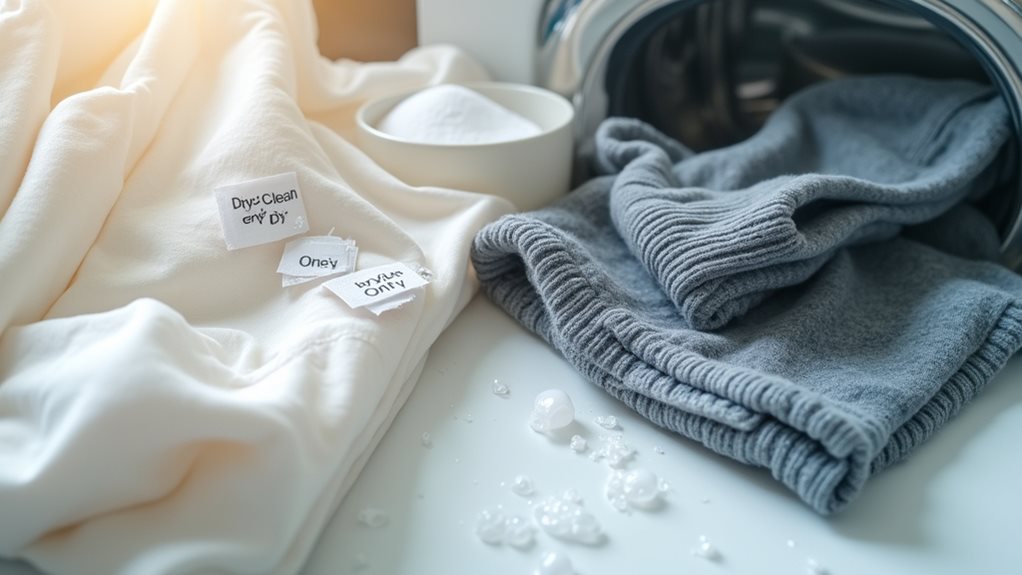
While those care labels might make you think every piece in your closet needs professional attention, I’ve discovered through years of laundry experiments (and a few happy accidents) that many items can actually be washed at home safely.
Don’t let intimidating care labels fool you – most of your supposedly dry-clean-only clothes can actually survive home washing just fine.
Cotton dress shirts, linen pants, and polyester blouses are items generally safe for home washing, despite what their tags suggest.
I’ve successfully hand washed silk scarves labeled “dry clean only” using gentle laundry detergent and cool water – they came out gorgeous!
Machine washable wool sweaters on delicate cycles work wonderfully too, though I learned this after accidentally shrinking my favorite cardigan 😅.
Certain fabrics like nylon and acrylic blends require minimal specific cleaning care, making proper care and maintenance surprisingly simple with basic dry cleaning at home techniques.
Keep in mind that while regular business attire like suits and dress shirts can often be washed at home, dry cleaning expenses for specialized work uniforms are generally only tax deductible when the clothing cannot be worn for everyday purposes.
